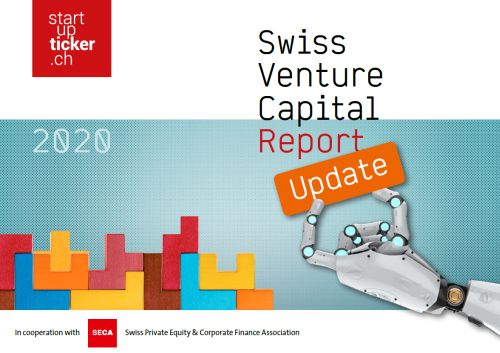
In the first half of 2020, CHF 760 million was invested in Swiss start-ups with 105 financing rounds completed, says a survey by online news portal startupticker.ch and investor association SECA. The total amount is well below the record of 2019, but is still high in a long-term comparison – and the number of rounds increased by nearly a quarter.
Investment in start-ups is associated with greater risk; in addition, Swiss start-ups are nearly always active internationally. These two facts suggest that investment will decline in a crisis such as that triggered by Covid-19. However, technology stocks have been among the drivers of the markets during the corona crisis, which in turn is an indication of investment in start-ups.
A survey by online news portal startupticker.ch and investor association SECA shows how investment developed in the first half of the year. A total of CHF 763.4 million in venture capital went into young Swiss companies, with 105 financing rounds completed. The whole report can be downloaded in the "Assets" section.
(Text auf Deutsch)
(Texte en français)
Missing mega investment
The total amount invested fell by 36% compared with the same period in 2019. This decrease is due exclusively to the lack of mega-financing rounds in the three-digit million range. Three of these rounds were announced in the first half of 2019. In 2020, the largest financing round – that of Scandit – amounted to CHF 77 million.
The majority of start-ups were able to attract more money in 2020 than in 2019. At CHF 3.9 million, the median investment is a good 20% higher than in the previous year. In addition, the sum generated in 2020 is high in a long-term comparison – at about 67% above the comparative value in 2018
The longstanding upward trend in the number of financing rounds continued unabated, with more than 20% more rounds completed than in the previous year.
Swiss VCs step into the breach
The crisis nevertheless has had an impact. Until now, foreign investors and foreign companies as buyers of Swiss start-ups have played a major role in this country, but the corona crisis has significantly reduced the importance of both. Swiss VCs have jumped into the gap. Their share of total capital invested has risen from about a quarter to half. The M&A market, on the other hand, has practically come to a standstill after a very good start in January.
Swiss development against the European trend
The peculiarities of developments in Switzerland are evident in comparison with other European countries. In northern and western Europe, the number of investments in the first half of 2020 decreased by 40% compared with the same period in 2019. The total amount of capital invested also decreased, but by only 18%. The number of financing rounds in excess of USD 100 million remained stable at just over 30, according to market research company Pitchbook.
The higher number of Swiss financing rounds, with an increase of more than 20% compared with the previous year, is due to the increasing activities of business angel clubs and existing and newly launched VC funds with a stronger connection to Switzerland. The lack of mega-financing rounds in Switzerland can be explained by the extraordinarily high importance of international investors, which have been held back by the corona crisis.
Swiss investors remain active
A survey among Swiss investors, carried out jointly with the Institute for Financial Services Zug IFZ at Lucerne University of Applied Sciences, provides important further insights and also gives ground for optimism. Investors have continued their investment activity almost unchecked during the crisis. Although fund managers expect delays in fundraising, they do not expect to raise less than expected. Three quarters of those surveyed assume that investment in Swiss start-ups will return to the record level of 2019 by 2021.
The development of investment in Swiss start-ups depends not only on Swiss investors. In order to continue the growth course, foreign donors have to become more active again and mega-financing rounds must be completed again. And last but not least, a revival of the M&A market is a necessary prerequisite in order to attract investment.
(Stefan Kyora)























































Please login or sign up to comment.
Commenting guidelines